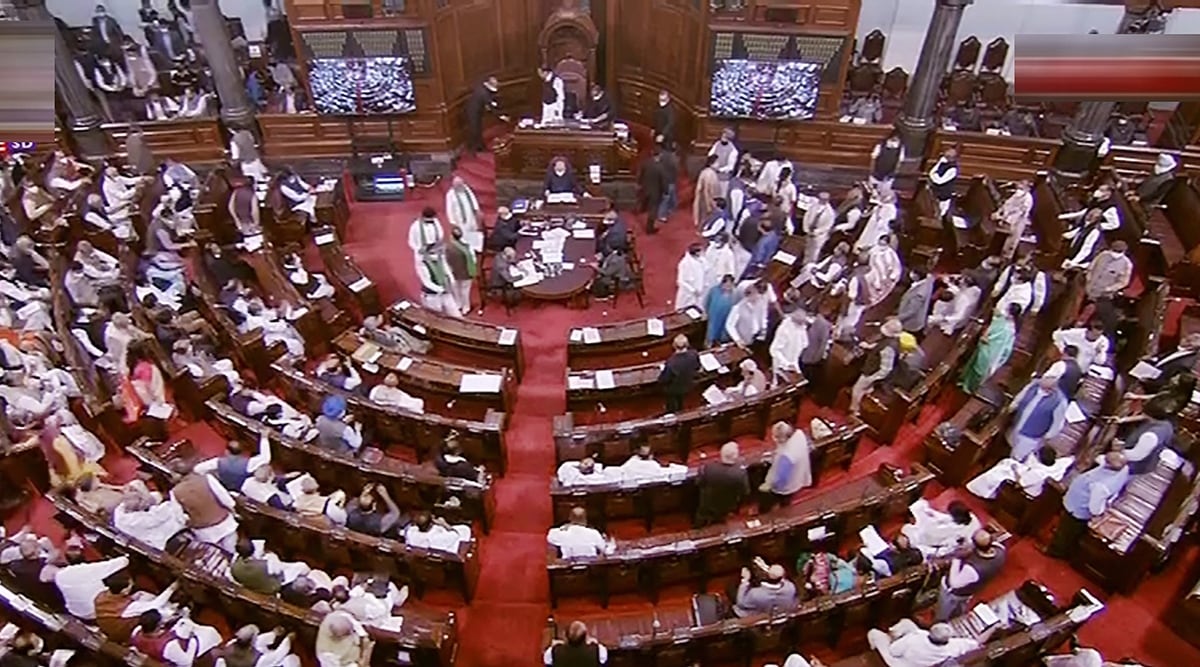How MPs’ questions are allowed and disallowed ?
Context
-
Recently, a question by an MP in Rajya Sabha, scheduled to be answered, was removed from the list of finally admitted questions. Over the last few sessions, MPs mainly from the Opposition have often alleged their questions have been disallowed.
How are questions admitted?
- In both Houses, elected members enjoy the right to seek information from various ministries and departments in the form of starred questions, unstarred questions, short notice questions and questions to private members.

Credit: IE - Usually, MPs’ questions form a long list, which then go through a rigorous process of clearance.
- The admissibility of questions in Rajya Sabha is governed by Rules 47-50 of the Rules of Procedure and Conduct of Business in the Council of States.
- Once a question that fulfils the conditions of admissibility is received, the Secretariat sends it to the ministry concerned.
- Once the facts are received from the ministry, the question is further examined for admissibility.
- A final list of questions is circulated to ministers, on the basis of which they frame their answers.
- In Lok Sabha, once the notice for questions is received, ballots determine priority. Starred, unstarred and short notice questions are entered into software, separately.
- Next, the questions are examined for admissibility under Rules 41-44 of the Rules of Procedure and Conduct of Business in Lok Sabha.
- For answering the questions, ministries and departments have been divided into five groups (I to V) that have been allotted Mondays, Tuesdays, Wednesdays, Thursdays and Fridays respectively.
- The grouping has been done in such a way that each minister has one fixed day in the week for answering questions in Rajya Sabha and another fixed day for answering questions in Lok Sabha.
What are starred, unstarred and other categories of questions?
- STARRED QUESTION: The member desires an oral answer from the minister. Such a question is distinguished by the MP with an asterisk. The answer can also be followed by supplementary questions from members.
- UNSTARRED QUESTION: The MP seeks a written answer, which is deemed to be laid on the table of the House by the concerned minister.
- SHORT NOTICE QUESTION: These are on an urgent matter of public importance, and an oral answer is sought. A notice of less than 10 days is prescribed as the minimum period for asking such a question.
- QUESTION TO PRIVATE MEMBER: A question can be addressed to a private member under Rule 40 of Lok Sabha’s Rules of Procedure, or under Rule 48 of Rajya Sabha’s Rules, provided that the question deals with a subject relating to some Bill, resolution or other matter for which that member is responsible.
When are the questions asked?
- In both Houses, the first hour of every sitting is usually devoted to asking and answering of questions, and this is referred to as the ‘Question Hour’.
- The total number of questions for any day is limited to 175, including 15 questions for oral answers, questions postponed from one list to another for written answers, and 15 questions pertaining to states under President’s Rule.
What kind of questions can be asked?
- Their admissibility is governed by Rules 47-50 (Rajya Sabha) and 41-44 (Lok Sabha). The Rajya Sabha Chairman or the Lok Sabha Speaker has the authority to decide whether a question or a part is or is not admissible under the norms of the House, and disallow any question or a part.
- In Rajya Sabha, among various norms, the question “shall be pointed, specific and confined to one issue only;
- it shall not bring in any name or statement not strictly necessary to make the question intelligible;
- if it contains a statement the member shall make himself responsible for the accuracy of the statement;
- it shall not contain arguments, inferences, ironical expressions, imputations, epithets or defamatory statements”.
- In Lok Sabha, questions that are not admitted include:
- those that are repetitive or have been answered previously;
- and matters that are pending for judgment before any court of law or under consideration before a Parliamentary Committee.
How often are questions disallowed?
- According to Rajya Sabha data, 833 questions were disallowed during the last Monsoon Session. For comparison, during the 2013-14 Winter Session, Rajya Sabha disallowed 748 questions.
- Once disallowed, it is often difficult for members to challenge the decision.
Visit Abhiyan PEDIA (One of the Most Followed / Recommended) for UPSC Revisions: Click Here
IAS Abhiyan is now on Telegram: Click on the Below link to Join our Channels to stay Updated
IAS Abhiyan Official: Click Here to Join
For UPSC Mains Value Edition (Facts, Quotes, Best Practices, Case Studies): Click Here to Join
